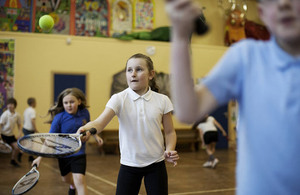PE and sport premium: more children benefiting from school sport
New research has shown the government’s £150 million a year PE and sport premium is helping to improve primary school sports provision.

Nine out of 10 primary schools have improved the quality of PE lessons thanks to the £150 million PE and sport premium, new research has shown.
The fund, introduced in 2013, goes directly to primary school headteachers who can use it however they want, to provide PE and sporting activities for pupils.
Today’s (9 September 2014) figures show that schools are getting real value for money, helping more children get active and healthy, and learning the confidence and skills that will help them to succeed in life.
Schools have used the money to recruit more PE teachers and sports specialists to improve the quality of lessons or after-school clubs, buy new equipment, offer a wider selection of sports and free after-school clubs.
The findings include:
- 91% of schools reported an increase in the quality of PE teaching thanks to the funding, with the remainder reporting quality remained the same
- 96% of schools reported improvements in pupils’ physical fitness, 93% saw improvements in behaviour, and 96% thought the funding had contributed to a healthier lifestyle for their pupils
- the proportion of schools using specialist PE teachers in lessons rose from 22% to 54%
- schools with a high proportion of free school meals (FSM) pupils were more likely to report improvements - 51% of schools with more than a quarter of FSM pupils reported an increase in available facilities compared to 39% of schools with the lowest level of FSM
- 84% of schools reported an increase in pupil engagement with PE during school time and 83% saw an increase in participation in after-school clubs
- around three quarters of schools used the premium to buy new equipment (76%) or provide more after-school sports clubs (74%)
- more than two thirds of schools (67%) increased the number of sports offered during lessons with 77% increasing the sports on offer during after-school clubs
- 63% of schools had increased the amount of competitive sport they play with other schools
- a third of schools used the premium to reduce the costs of after schools clubs while a fifth made some clubs completely free to attend
Education Secretary Nicky Morgan and Children and Families Minister Edward Timpson joined Olympic gold medallist and London 2012 cycling star Victoria Pendleton for a visit to Bacons College, Rotherhithe, where they saw first-hand the benefits of competitive sport.
The group met children from local primary schools trying their hand at a range of sports before meeting some of Bacon College’s stars of the future - including the winners of the London Youth Games 4 x 100m relay, an aspiring Chelsea footballer and a nationally ranked badminton player.
Education Secretary Nicky Morgan said:
We want to create a world-class education system that gives children all the skills they need to succeed in modern Britain. Literacy and numeracy are part of that but confidence, discipline, and determination are equally important.
Some of those things can be taught in the classroom but the lessons children learn while playing sport, such as the importance of teamwork and the satisfaction of achieving a goal, are invaluable.
I’m delighted the PE and sport premium is having a positive effect on sports in our schools. Whether you’re an Olympic champion or a park runner, sport really can change people’s lives and I want everyone to take part.
Olympic gold medallist Victoria Pendleton said:
Developing a love of sport early on goes a long way to helping children develop confidence and competence.
Whether it’s a netball tournament between a few local schools or being part of an after-school football club, competitive sport really helps children learn resilience, team work, and builds character - not to mention the clear benefits for their health.
Sport at school shouldn’t be sidelined - which is why the extra funding primary schools are getting for sport will make such a valuable difference.
The PE and sport premium was launched in 2013 providing over £150 million a year to improve the quality of provision in every state primary school in England until the 2015 to 2016 financial year. The funding goes directly to primary school headteachers so that they can decide how best to use it to provide PE and sporting activities for pupils.
A typical primary school with 250 primary-age pupils this year received £9,250, the equivalent of around 2 days a week of a primary teacher’s or a coach’s time.
The fund has been used to:
- upskill teachers to improve the quality of sport lessons and invest in quality coaching
- provide more opportunities for pupils to take part in inter-school competitions and offer more after-school clubs
- purchase better equipment
- introduce new and unusual sports as diverse as fencing, climbing, and ultimate Frisbee and Danish long-ball to encourage more children to enjoy sport
- improve sport teaching for children with special educational needs
The research report, published today (9 September, 2014), was based on a survey of primary schools between April and July 2014. It looked at how headteachers have spent the money and the impact of that spending on schools.
The full report is available on GOV.UK.
DfE media enquiries
Central newsdesk - for journalists 020 7783 8300